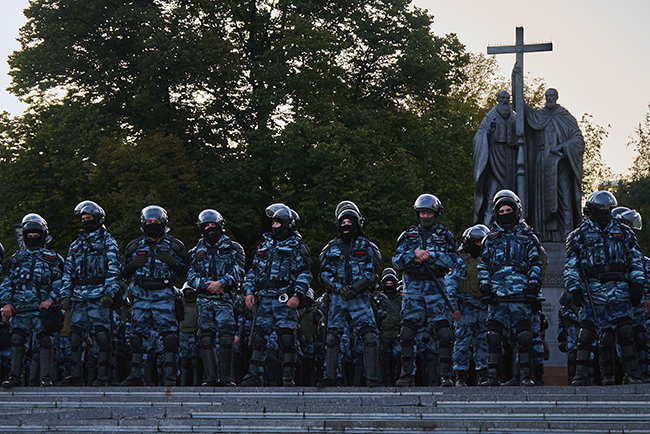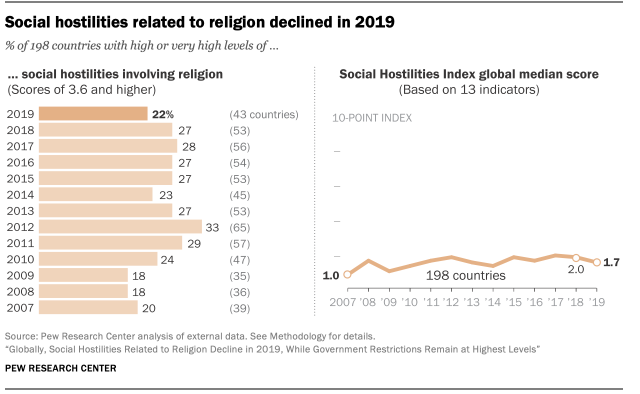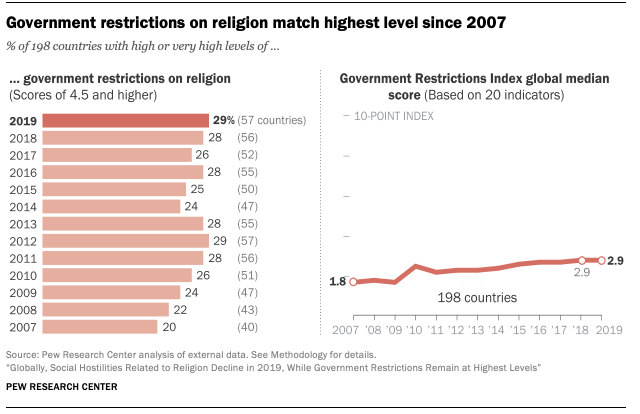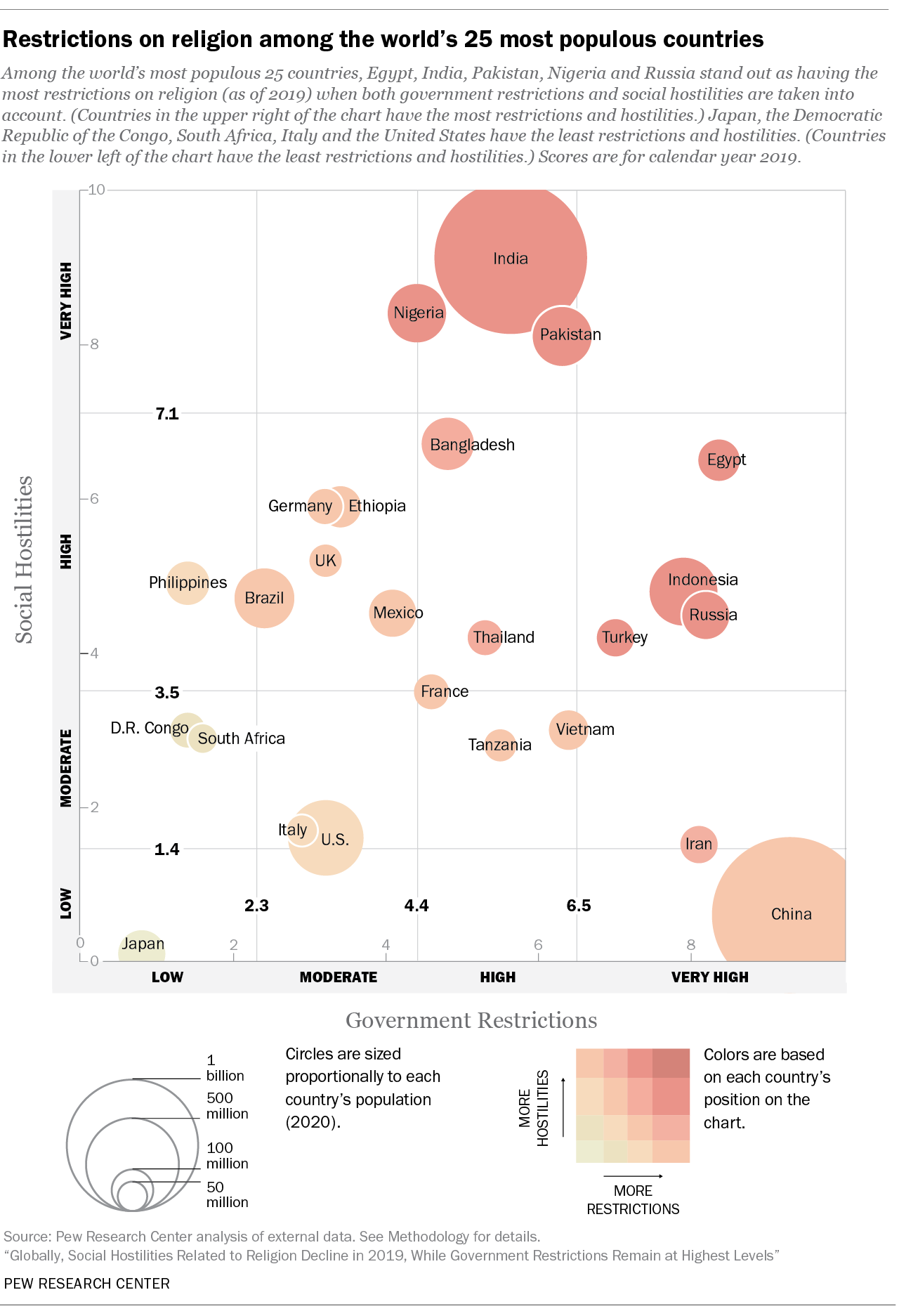
By Aaron Earls
Religious people around the world may be safer from social hostilities but more at risk from government restrictions, according to new analysis from Pew Research.
Generally, countries became more hospitable to religion in Pew’s analysis from 2018 to 2019, prior to the COVID-19 pandemic but the most recent year for which data is available. Only 35% of the countries studied grew more restrictive, and most of those increases were small. Half of the countries (50%) became less hostile to religion.
Only 35% of the countries studied by @pewresearch grew more restrictive toward religion, and most of those increases were small. Half of the countries (50%) became less hostile in 2019. Click To TweetTo determine a country’s level of religious restrictions and hostilities, Pew Research analyzes 13 indicators of social hostilities and 20 indicators of government restriction. While the decline in social hostilities led to the overall drop, government restrictions increased.
Social hostilities
In 2019, Pew found 22% of countries studied had at least high levels of social hostilities surrounding religious groups. That’s down from 27% in 2018, and from a peak of 33% in 2012. Globally, the median score on Pew Research’s 10-point scale measuring social hostilities dropped from 2.0 in 2018 to 1.7 in 2019, reaching the lowest level since 2014.
Specifically, Pew found a drop in religion-related terrorism to the lowest levels since the study began in 2007. In 2019, 49 countries dealt with active religion-related terrorist groups, down from 64 in 2018 and a high of 82 in 2014. The Global Terrorism Database, a source Pew used for the study, noted 2019 was “the fifth consecutive year of declining global terrorism.”
2019 was “the fifth consecutive year of declining global terrorism,” according to the Global Terrorism Database. Click To TweetThe reported noted improvement for Christians in several places. In Bolivia, Protestant missionaries had been expelled from certain areas in 2018, but none of those were reported in 2019. In Egypt, social hostilities fell from “very high” to “high” as anti-Christian attacks declined.

Government restrictions
Yet government restrictions of religion, including official laws, policies and actions that impinge on religious beliefs and practices, remained at the highest level in the history of the study. The evaluation of 198 countries show the global median score on Pew’s 10-point scale measuring government restrictions remained at 2.9, after reaching that record high in 2018. Almost 3 in 10 countries (29%) have at least high levels of government restrictions on religion.
China continues to detain upwards of a million Uyghur Muslims in Xinjiang province, while also stepping up crackdowns on other religions, including Christianity. Government-induced violence in Myanmar has led to thousands of Christians being displaced.
China installed surveillance equipment in churches and other religious buildings and required certain religious groups to install monitoring software on their phones. Click To TweetFor the first time in the study, Pew began to track online restrictions by governments and use of technology such as facial recognition or biometric data to curb religious freedom. In the United Arab Emirates, the government controls the two main internet providers and blocks websites with information on non-Islamic religions and those that feature testimonies from Muslims who convert to Christianity. China installed surveillance equipment in churches and other religious buildings and required certain religious groups to install monitoring software on their phones.

Widespread harassment
While overall levels declined, the number of countries in which religious groups face any type of harassment reached a new high in 2019. Of the 198 countries studied, at least one religious group faced some type of pressure in 190 nations.
As Christians and Muslims are the world’s largest and most widely dispersed religious groups, they face the most opportunities for social hostilities and government restrictions. Christians were harassed in the most countries (153), followed by Muslims (147) and Jews (89). Specifically, Christians faced government harassment in 128 countries and social harassment in 107.
In 2019, Christians were harassed in the most countries (153), followed by Muslims (147) and Jews (89), according to @pewresearch. Click To TweetMuslims most often face restrictions in Europe as well as the Middle East in which the pressure comes from other Muslim groups (often between Sunni and Shiite). Christians are often targets in the Middle East and Asia. Of the 20 countries in the Middle East-North Africa region, 19 had some form of harassment targeting Christians.
In Algeria, authorities arrested Christians who staged a peaceful protest over the closing of a church. Pew reports of a Christian being arrested in Pakistan as a suspect in a theft case. He was tortured while in police custody and dead shortly after being released. The victim’s brother said he was told by one of the arresting officers, “I know how to deal with these infidels.”
Overall, the Middle East-North Africa and Asia-Pacific regions have the highest levels of government restrictions on religion. Sub-Saharan Africa and the Americas have the lowest, though Open Doors has noted increased Christian persecution in some areas of Sub-Saharan Africa. Middle East-North Africa also have the highest region scores for social hostilities, while the Americas has the lowest.
Among the 25 most populous countries in the world, Egypt, India, Pakistan, Nigeria, and Russia have the highest overall levels of combined government restrictions and social hostilities involving religion in 2019. India had the highest levels of social hostilities, while China topped the list for government restrictions.
Japan, the Democratic Republic of Congo, South Africa, Italy, and the United States had the lowest overall scores. Japan had the lowest score for both social hostilities and government restrictions.










